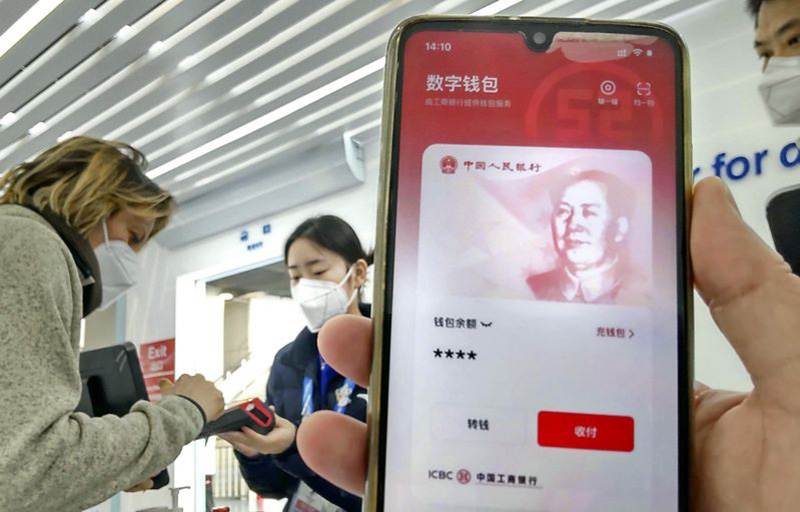
A Beijing Winter Games-themed e-CNY card
14:53 JST, February 20, 2022
BEIJING — At Beijing Winter Games venues, China’s digital currency has been designated as an official payment method.
China has been putting an emphasis on promoting the use of this digital yuan, or e-CNY.
To pay in the digital currency, the official smartphone app or a physical e-CNY card can be used.
China is trying to show off to the world that the country’s digital currency is in the stage of practical use, but private smartphone payment systems are already widespread within the country, making it difficult to expand use of e-CNY.
“It feels the same as using WeChat Pay or other such systems,” said a 21-year-old female university student Saturday who volunteered for the Beijing Olympics, referring to a popular smartphone payment system in China.

The e-CNY app is seen on a smartphone at the Main Media Center in Beijing on Saturday.
She had just bought Olympic goods with digital yuan at an official shop in the Main Media Center in Beijing.
To pay via the official app, users need to select a bank that supports the e-CNY service, then register their mobile phone number and password, before charging the digital yuan in advance. Payment is completed with a scan of their QR code at the register.
The physical e-CNY card has been recommended for foreign visitors in China for a short time who do not have ID issued by China nor bank accounts in the country. Users of the card scan their passport at a designated automatic exchange machine and insert foreign currency to receive the card charged in e-CNY. Then they just tap the card to pay.
In October 2020, China’s central bank, the People’s Bank of China, started a pilot program involving the public. Currently, the programs are underway in 12 cities, including Beijing and Hebei Province’s Zhangjiakou, where Winter Games venues are situated.
China, however, is struggling to increase the number of e-CNY users. The cumulative amount of digital yuan transactions was 87.5 billion yuan (about ¥1.6 trillion) at the end of 2021, but this was only 0.02% of the transaction value of mobile payment services in 2020.
During the Games, e-CNY use in Beijing has been limited to areas inside the bubble, such as Olympic venues, as well as certain stores and designated services.
The WeChat messaging app and Alipay, which handles asset management, have established payment apps that are essential to daily life in China. Those apps also have many other features, giving users few reasons to opt for using e-CNY just for payments.
“WeChat Pay seems to be enough,” said a reporter who belongs to China’s state-run media.
There are also concerns that what and where people buy can be tracked by Chinese authorities. China’s central bank advocates the principle of “anonymity for small payments” and “minimum collection of personal information.” In China, however, principle and practice are often different.
The Winter Games have been set up as a great opportunity for China to promote e-CNY. Amid the pandemic, however, China had to limit admission to the Games. As for many foreign media members, many seemed content just to use credit cards bearing the logo of Visa, a worldwide sponsor of the Olympic and Paralympic Games.
Top Articles in World
-

Israeli Ambassador to Japan Speaks about Japan’s Role in the Reconstruction of Gaza
-

Videos Plagiarized, Reposted with False Subtitles Claiming ‘Ryukyu Belongs to China’; Anti-China False Information Also Posted in Japan
-

North Korea Possibly Launches Ballistic Missile
-

Chinese Embassy in Japan Reiterates Call for Chinese People to Refrain from Traveling to Japan; Call Comes in Wake of ¥400 Mil. Robbery
-

Russia: Visa Required for Visiting Graves in Northern Territories, Lifting of Sanctions Also Necessary
JN ACCESS RANKING
-

Japan PM Takaichi’s Cabinet Resigns en Masse
-

Japan Institute to Use Domestic Commercial Optical Lattice Clock to Set Japan Standard Time
-

Israeli Ambassador to Japan Speaks about Japan’s Role in the Reconstruction of Gaza
-

Man Infected with Measles Reportedly Dined at Restaurant in Tokyo Station
-

Videos Plagiarized, Reposted with False Subtitles Claiming ‘Ryukyu Belongs to China’; Anti-China False Information Also Posted in Japan






















